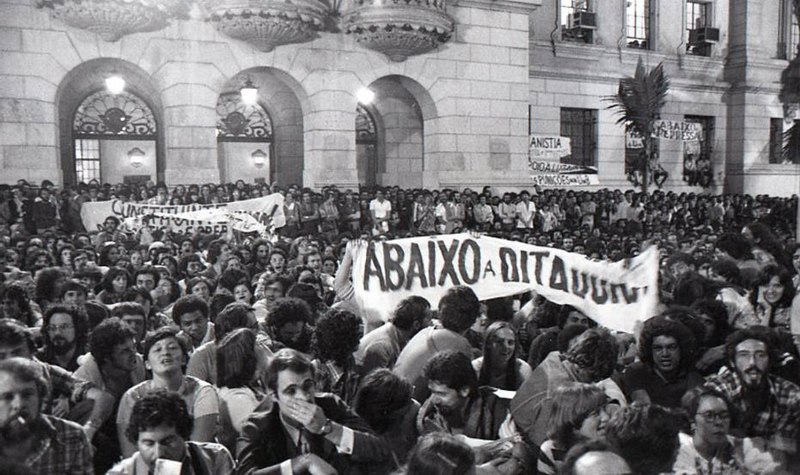12: Optimism and Unease- 1970-2000
- Page ID
- 147167
- Examine how democratization and religious reaction shaped the globe by 2000
-
Analyze the impact of anti-racist movements during the late twentieth-century
- What factors brought about the rise of right-wing religious movements?
- How were the movements for democratization accompanied by calls for racial justice?
Significant political and social changes occurred during the 1970s as a major economic crisis set in. This was the largest economic downturn since the Great Depression. Although there were a number of causes for this major recession, the crisis was triggered by an oil shock after an oil cartel, known as the Organization of the Petroleum Exporting Countries (OPEC), cut production and raised prices. By 1970, this cartel controlled most of the production of oil. When Israel went to war with Syria and Egypt in 1973, the US and Western Europe supported Israel. OPEC then put an oil embargo on these nations and quadrupled the price of oil. This sent shockwaves globally because the USA and Western Europe were the largest economies in the world. Western Europe was entirely dependent on OPEC oil. As a consequence, inflation and unemployment both went up. At the same time, cultural values and norms were changing. Women were gaining rights, sexual norms were loosening, and pop culture promoted newer more modern secular values.
It is within this context that two major trends were apparent. On one hand, there was a massive wave of democratization as the authoritarian governments lost legitimacy for their failure to resolve the economic crisis. This democratic wave began in southern Europe but then spread to Latin America, Eastern Europe, and then to parts of Africa and East Asia. In many instances calls for democracy were accompanied by movements in Latin America and Africa for racial equality. In Mexico and Guatemala, indigenous movements such as the Zapatista Rebellion put pressure on the ruling party to have freer and fairer elections. Similarly, Africans and Diasporic Africans demanded voting and civil rights. By the 1990s, the majority of Afro-Brazilians and South African Blacks were able to vote for the first time when democratic elections were held. Figure 12.1 shows protesters in Brazil in 1977 and the sign shown says "Down with the dictatorship." What would these protesters be demanding? There was much optimism by 2000 as there were more democracies globally than at any other time in world history.

Figure 12.1: Brazilian protestors in 1977 by Kenji Honda, Photos de Estadao, in the Public Domain
On the other hand, many people turned to cultural explanations for economic stagnation and decline. Many in the USA and the Middle East sought to rejuvenate their societies through new governments that promoted traditional patriarchic religious ideas. These religious movements were often accompanied by racial and ethnic intolerance. Conservative Christians in the USA backed politicians who supported anti-feminist and anti-civil rights platforms. These Christians were part of an Evangelical Protestant movement that was uneasy with many of the cultural changes taking place in the USA since the 1960s. In the Middle East conservative Muslims sought to curtail women’s rights and impose authoritarian governments. These Muslims wanted a theocracy where religious leaders ruled and people were governed under religious laws. At the same time, in Israel, the Orthodox Jewish-backed Likud Party made increasingly Biblical claims on areas that had historically been inhabited by Muslim Palestinians. These Orthodox Jews likewise embraced traditional patriarchic values. In the 1970s, these countries had secular reformist governments. However, Muslims in the Middle East, Jews in Israel, and Christians in the USA were becoming more religious and wanted governments that promoted their values. The new regimes that emerged did not bring about stability in the Middle East in the 1980s but caused more conflict.
- 12.1: Democracy Thwarted in the Middle East - Iran in the 1970s
- Democratic forces in Iran were not powerful enough to establish a new government in 1979. As a consequence, a theocracy was established.
- 12.2: The Spread of Extremist Religious Movements in the Middle East
- The economic crisis, changing cultural values of the 1970s, and the successful theocratic revolution in Iran had major consequences on the Arab Middle East and Israel. Orthodox Jews and theocratic Sunni Muslims gained more power.
- 12.3: Religious Resurgence in the USA - Evangelical Protestantism
- The religious wave also struck the USA. Protestant evangelicalism rose as the US experienced economic decline and changing values.
- 12.4: Religious Conflict Erupts in the Middle East
- The rise of more militant Islam resulted in a major class between Iran and Iraq in the Middle East. Sunni nations provided billions of dollars to support Iraq.
- 12.5: The Soviet Union on the Brink of Collapse
- The USSR had been one of the two superpowers following World War II, but by the 1980s, the state and its government were in disarray. The election of Mikhail Gorbachev was seen as a potential salvation for the USSR, but instead inadvertently helped destroy it.
- 12.6: The Collapse of the Soviet Union
- The collapse of the Soviet Union led to major changes in Eastern Europe. It also fueled the rise of conservative dictators eager to control the areas that were part of the former USSR.
- 12.7: Third Wave Democratization - Latin America
- Brazil was one of the first Latin American nations to begin to democratize. This push for democratization was accompanied by demands for racial equality.
- 12.8: Third Wave Democratization - Africa
- The third wave of democratization also resulted in democratization for much of Africa. With the Cold War winding down, the apartheid government in South Africa lost global support.
- 12.9: Chapter Summary and Key Terms
- By 2000, there were more democracies in the world than at any other time in human history. Much of the world was optimistic, but at the same time there were major reactionary religious movements that had emerged.
Thumbnail: George Bush Meets Nelson Mandela, George Bush Presidential Library and Museum, in the Public Domain.


